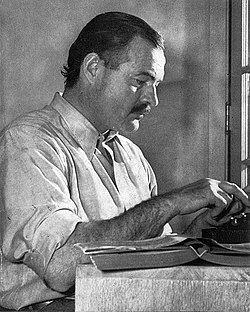Ernest Hemingway Quote
The first panacea for a mismanaged nation is inflation of the currency; the second is war. Both bring a temporary prosperity; both bring a permanent ruin. But both are the refuge of political and economic opportunists.Ernest Hemingway War, Political, BothNever think that war, no matter how necessary, nor how justified, is not a crime.Ernest Hemingway War, Justified, MatterOnce we have a war there is only one thing to do. It must be won. For defeat brings worse things than any that can ever happen in war.Ernest Hemingway War, Once, HappenThe world is a fine place and worth the fighting for and I hate very much to leave it.Ernest Hemingway Hate, Leave, WorthPersonal columnists are jackals and no jackal has been known to live on grass once he had learned about meat - no matter who killed the meat for him.Ernest Hemingway Once, Matter, LearnedThe only thing that could spoil a day was people. People were always the limiters of happiness except for the very few that were as good as spring itself.Ernest Hemingway Happiness, Good, FewBut man is not made for defeat. A man can be destroyed but not defeated.Ernest Hemingway Defeat, Defeated, DestroyedYou're beautiful, like a May fly.Ernest Hemingway Beauty, Beautiful, FlyHis talent was as natural as the pattern that was made by the dust on a butterfly's wings. At one time he understood it no more than the butterfly did and he did not know when it was brushed or marred.Ernest Hemingway
The first panacea for a mismanaged nation is inflation of the currency; the second is war. Both bring a temporary prosperity; both bring a permanent ruin. But both are the refuge of political and economic opportunists.Ernest Hemingway War, Political, BothNever think that war, no matter how necessary, nor how justified, is not a crime.Ernest Hemingway War, Justified, MatterOnce we have a war there is only one thing to do. It must be won. For defeat brings worse things than any that can ever happen in war.Ernest Hemingway War, Once, HappenThe world is a fine place and worth the fighting for and I hate very much to leave it.Ernest Hemingway Hate, Leave, WorthPersonal columnists are jackals and no jackal has been known to live on grass once he had learned about meat - no matter who killed the meat for him.Ernest Hemingway Once, Matter, LearnedThe only thing that could spoil a day was people. People were always the limiters of happiness except for the very few that were as good as spring itself.Ernest Hemingway Happiness, Good, FewBut man is not made for defeat. A man can be destroyed but not defeated.Ernest Hemingway Defeat, Defeated, DestroyedYou're beautiful, like a May fly.Ernest Hemingway Beauty, Beautiful, FlyHis talent was as natural as the pattern that was made by the dust on a butterfly's wings. At one time he understood it no more than the butterfly did and he did not know when it was brushed or marred.Ernest Hemingway
Related Quotes
About Ernest Hemingway
Hemingway was raised in Oak Park, Illinois, a suburb of Chicago. After high school, he spent six months as a reporter for The Kansas City Star before enlisting in the Red Cross. He served as an ambulance driver on the Italian Front in World War I and was seriously wounded by shrapnel in 1918. In 1921, Hemingway moved to Paris, where he worked as a foreign correspondent for the Toronto Star and was influenced by the modernist writers and artists of the "Lost Generation" expatriate community. His debut novel, The Sun Also Rises, was published in 1926. In 1928, Hemingway returned to the U.S., where he settled in Key West, Florida. His experiences during the war supplied material for his 1929 novel A Farewell to Arms.
In 1937, Hemingway went to Spain to cover the Spanish Civil War, which formed the basis for his 1940 novel For Whom the Bell Tolls, written in Havana, Cuba. During World War II, Hemingway was present with Allied troops as a journalist at the Normandy landings and the liberation of Paris. In 1952, his novel The Old Man and the Sea was published to considerable acclaim, and won the Pulitzer Prize for Fiction. On a 1954 trip to Africa, Hemingway was seriously injured in two successive plane crashes, leaving him in pain and ill health for much of the rest of his life. He committed suicide at his house in Ketchum, Idaho, in 1961.
